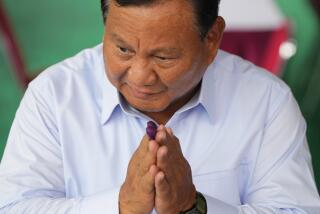Ex-Rebel Sweeps to Victory in East Timor
- Share via
DILI, East Timor — Jose Alexandre “Xanana” Gusmao has won East Timor’s first presidential election, completing his transformation from a poet to a gun-toting guerrilla commander to a respected statesman.
The popular 55-year-old Gusmao has been the symbol of East Timor’s struggle for independence since the former Portuguese colony was invaded by Indonesia in 1975.
Gusmao’s long-expected landslide victory was formalized today when the U.N. electoral commission announced that he had won 82.7% of the 378,538 votes cast in Sunday’s ballot.
His sole challenger, Francisco Xavier do Amaral, took 17.3%. Remaining ballots from Sunday’s election were ruled invalid.
“We won,” said Milena Pires, Gusmao’s campaign manager. “We have around 80% already, which is an excellent achievement.”
Do Amaral, who said he was running only to provide the electorate a choice, had no immediate plans to concede defeat, his supporters said.
The elections are the final step in East Timor’s long and bloody struggle to break free of foreign rule. On May 20, it will become the world’s newest nation when its transitional U.N. administration formally hands over the running of the country.
Gusmao joined East Timor’s independence movement in 1974 after a coup in Lisbon spelled the end of Portuguese rule.
Before that, he was a fun-loving young man in the colony’s capital, Dili. His nickname, Xanana, he says, is derived from the American rock ‘n’ roll group Sha Na Na.
He wrote poetry and was goalkeeper for a soccer team.
During Indonesia’s 1975 invasion, Gusmao fled to the mountains with the pro-independence guerrilla group Falintil, a Portuguese acronym for the Armed Forces of the National Liberation of East Timor.
Although the rebels mounted fierce resistance, they were badly outgunned by the Indonesian military. About 200,000 people died in the invasion and ensuing guerrilla war. Gusmao assumed command in 1981 after Falintil’s leaders died.
Gusmao was captured in 1992 in what Indonesia portrayed as a deathblow to the independence movement.
Instead, Gusmao continued the campaign from a jail in Jakarta and quickly became Indonesia’s most famous political prisoner. He was released in 1999.
More to Read
Sign up for Essential California
The most important California stories and recommendations in your inbox every morning.
You may occasionally receive promotional content from the Los Angeles Times.













